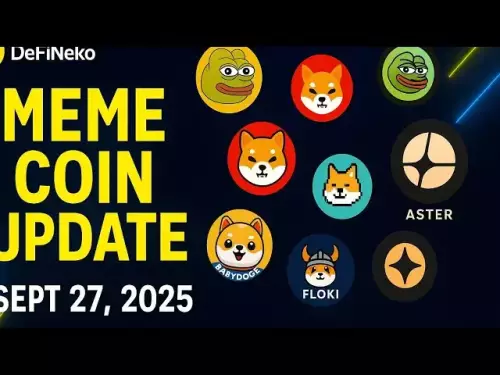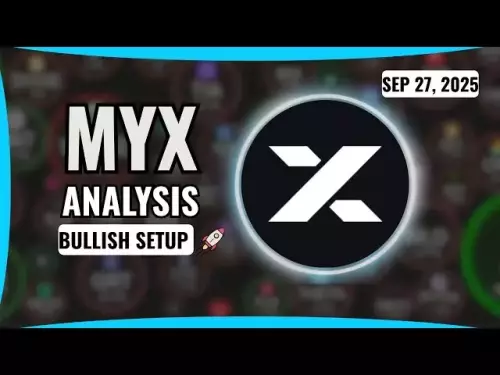 |
|
 |
|
 |
|
 |
|
 |
|
 |
|
 |
|
 |
|
 |
|
 |
|
 |
|
 |
|
 |
|
 |
|
 |
|
Cryptocurrency News Articles
Justin Sun, WLFI, and the Blacklisted Supply: A Crypto Soap Opera
Sep 25, 2025 at 09:58 pm
Justin Sun's involvement with WLFI takes a dramatic turn as his tokens get blacklisted, raising questions about governance and stablecoin safety.

Hold on to your hats, crypto enthusiasts! The drama surrounding Justin Sun and World Liberty Financial (WLFI) just keeps getting juicier. The latest plot twist? A significant portion of Sun's WLFI tokens have been blacklisted, sparking a debate about centralized control versus decentralization, and raising eyebrows about the stability of Sun-backed stablecoins.
The Blacklist Bonanza
So, what exactly happened? Apparently, the WLFI team decided to freeze a large chunk of Justin Sun's tokens after he transferred them to exchanges. This move added his wallet to a very exclusive blacklist, one that previously only included addresses linked to Binance and a couple of on-chain identities. Here's the kicker: Sun's wallet accounts for a whopping 99.9% of all blocked tokens! Ouch.
Did Justin Sun Expose WLFI’s Governance Problems?
This situation is particularly interesting because Sun isn't just some random advisor. He's a major investor, and WLFI has even incorporated assets linked to him, like TRON and Wrapped Bitcoin (WBTC), into its portfolio. The decision to blacklist his tokens highlights the inherent tension between the project's need for high-profile backers and its commitment to decentralization.
Using a blacklist, a centralized mechanism, to control the tokens of a key figure like Sun throws the project’s governance into question. It makes you wonder: who really calls the shots at WLFI, and how autonomous is the team when dealing with big money players?
USDD: Stablecoin Shenanigans
But wait, there's more! The drama extends beyond WLFI to Justin Sun's stablecoin, USDD. This stablecoin, which once promised a juicy 20% yield, has had a rather turbulent existence. From abandoning its original roadmap to questions about its collateral, USDD has raised more than a few red flags. Even the existence of two versions, USDD 1.0 and USDD 2.0, adds to the confusion.
USDD 1.0, despite being supposedly sunset, still holds a substantial amount of tokens. Both versions exhibit highly concentrated holdings, with large portions controlled by addresses linked to Sun or his exchanges. This centralization, coupled with a lack of transparency regarding collateral, raises serious questions about the stability and safety of these stablecoin systems. Where's the decentralization, folks?
The Card Game
Amidst all this, WLFI is pushing forward with its plans, including a branded debit card linked to Apple Pay that allows payments using its USD1 stablecoin. This move aims to drive everyday use of the stablecoin and expand into the Asian market through partnerships. However, integrating a stablecoin with mainstream payment systems brings its own set of challenges, including regulatory scrutiny and the need for transparency.
My Two Satoshis
Okay, here’s my take: While the WLFI debit card is a step in the right direction, the issues surrounding Justin Sun's blacklisted tokens and the concerns about USDD's centralization can’t be ignored. The core value of cryptocurrency lies in its promise of decentralization, yet these events suggest the opposite. Until these issues are addressed transparently, it's hard to view these projects with complete confidence. I'm not saying it's all doom and gloom, but proceed with caution, my friends. Always do your own research and don't invest more than you can afford to lose.
So, what's next in this crypto saga? Only time will tell. But one thing's for sure: the world of crypto is never short on surprises. Until next time, stay curious, stay informed, and remember to keep your private keys safe!
Disclaimer:info@kdj.com
The information provided is not trading advice. kdj.com does not assume any responsibility for any investments made based on the information provided in this article. Cryptocurrencies are highly volatile and it is highly recommended that you invest with caution after thorough research!
If you believe that the content used on this website infringes your copyright, please contact us immediately (info@kdj.com) and we will delete it promptly.





























































